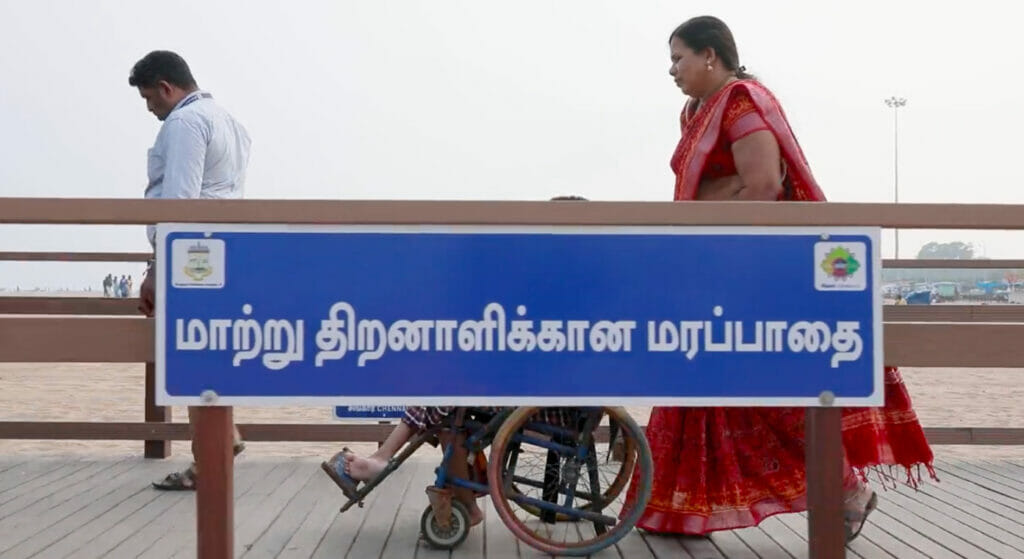Cyclone Mandous uproots trees, damages Marina beach ramp
Cyclone Mandous left a trail of destruction in its wake over the past weekend with hundreds of trees uprooted and damage to the newly inaugurated accessible pathway for persons with disability on the Marina beach.
The cyclone resulted in the uprooting of over 200 trees in 107 locations and generated 645 tonnes of garden waste. Frontline workers had to clear the trees on war footing. The waste generated was sent to the dump yards in Perungudi and Kodungaiyur.
Another fallout from the cyclone was the destruction of the viewing deck of the accessible pathway on Marina beach. The pathway had only been inaugurated a few weeks before the cyclone and cost Rs 1.14 crores. The civic body came into criticism as the ramp could not withstand the rain and winds brought on by the cyclone. Officials provided assurance that the ramp would be fixed and learnings from the incident will be incorporated during the construction of the ramp in Besant Nagar.
Source: The Hindu | The NewsMinute

Civic body fails to meet source segregation goals
The Greater Chennai Corporation’s decentralised waste management model has been hamstrung by poor source segregation across the city. A recent RTI revealed that the overall source segregation in the 15 zones was at a mere 42%. This falls way short of the civic body’s target of 80% source segregation in the city. The zones with the poorest showing are Anna Nagar, Kodambakkam, Tondiarpet, Royapuram, Thiru Vi Ka Nagar and Teynampet.
Of this, four zones have segregation below 30% while segregation in the other two zones stands at slightly above 30%. Valasaravakkam, Alandur and Shollinganallur zones fared best, with Sholinganallur having 63% source segregation.
The actual levels of source segregation at the door-to-door level is expected to be even lower as these numbers include the segregation carried out by those who collect the waste in battery-operated vehicles.
Officials responded to the poor numbers stating that source segregation is a habit that must be built over time among the public and that more awareness is being spread on the issue.
Source: The New Indian Express
Read more: Can Chennai ever become a bin-less city?
New sponge parks to combat flooding in Chennai
The Greater Chennai Corporation (GCC) plans to set up sponge parks in the city to combat flooding at the street level across the city. The number of parks to be set up in this regard would be 47. Work on five such parks has been underway with the rest to being soon. Sponge parks will also help in recharging groundwater in addition to preventing flooding.
The cost of the project will be Rs 92 lakh for the five parks. The parks will have mini ponds and trenches. The runoff from the roads and stormwater drains will be connected to the ponds in the sponge parks. The trenches will be used to carry the water to the ponds. The ponds will be fenced for safety.
Residents expressed reservations that the existence of the ponds might lead to illegal sewage dumping in the parks.
Source: The Times of India
Bio-CNG plants to reduce carbon footprint
In order to reduce the carbon footprint new bio-CNG plants are set to come up in the city. Five such plants will be set up across the city at a cost of Rs 10 crore per plant. The plants will be established in Manali, Koyambedu and Shollinganallur. The bio-CNG plants will receive wet waste from across the city.
The plants will be run under a public-private partnership model with private companies receiving land and garbage from the civic body with the civic body in turn getting a royalty fee of Rs 35 per tonne of waste. The civic authorities stressed the importance of source segregation by the residents so as to have wet waste of quality that can be fed into the CNG plants.
Source: The Hindu
Read more: How to produce biogas from kitchen waste and reduce your LPG bills
Public consultation on third master plan for Chennai
The Chennai Metropolitan Development Authority (CMDA) has called for public consultations in five locations across Chennai on December 17th and 18th for the third master plan. The preparation of the vision document for the third master plan for Chennai is underway at present. The meetings will be held at Manali, Thiruvottiyur, Madhavaram, Royapuram and MKB Nagar.
The master plan will be prepared based on the vision document. A consultant, LEA Associates South Asia Pvt Ltd, has been appointed for the drafting of the vision document. The vision document will cover 20 years. The third master plan will be notified by December 2025 or latest by April 2026. The master plan.
Source: DTNext
[Compiled by Aruna Natarajan]
Also read:
- Illegal construction in Chennai: Where are the rules and whom can one report to?
- Chennai’s empty plots and OSR land can help fight flooding and drought